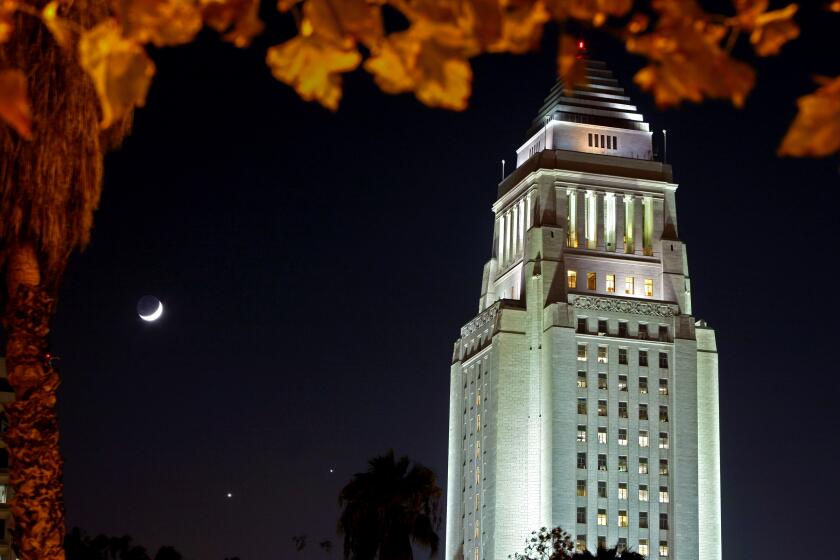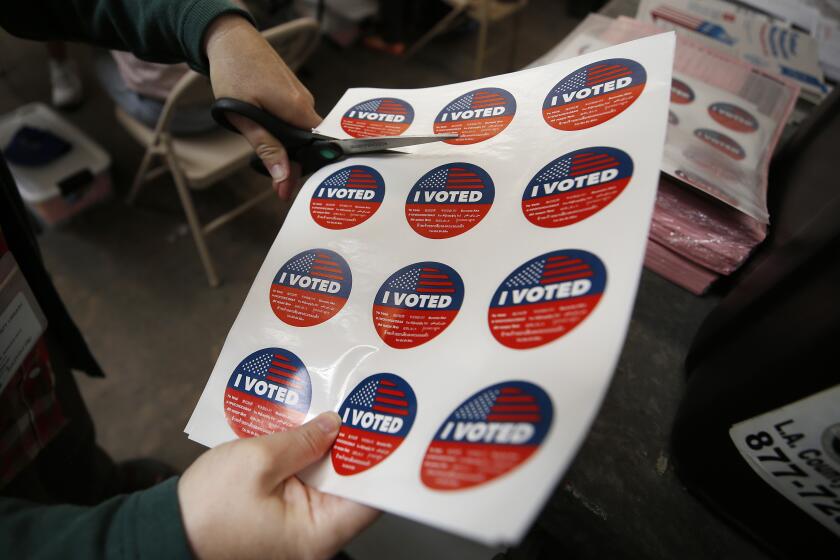Homelessness and ‘the soul of the Westside’: Stakes high in race to replace Mike Bonin
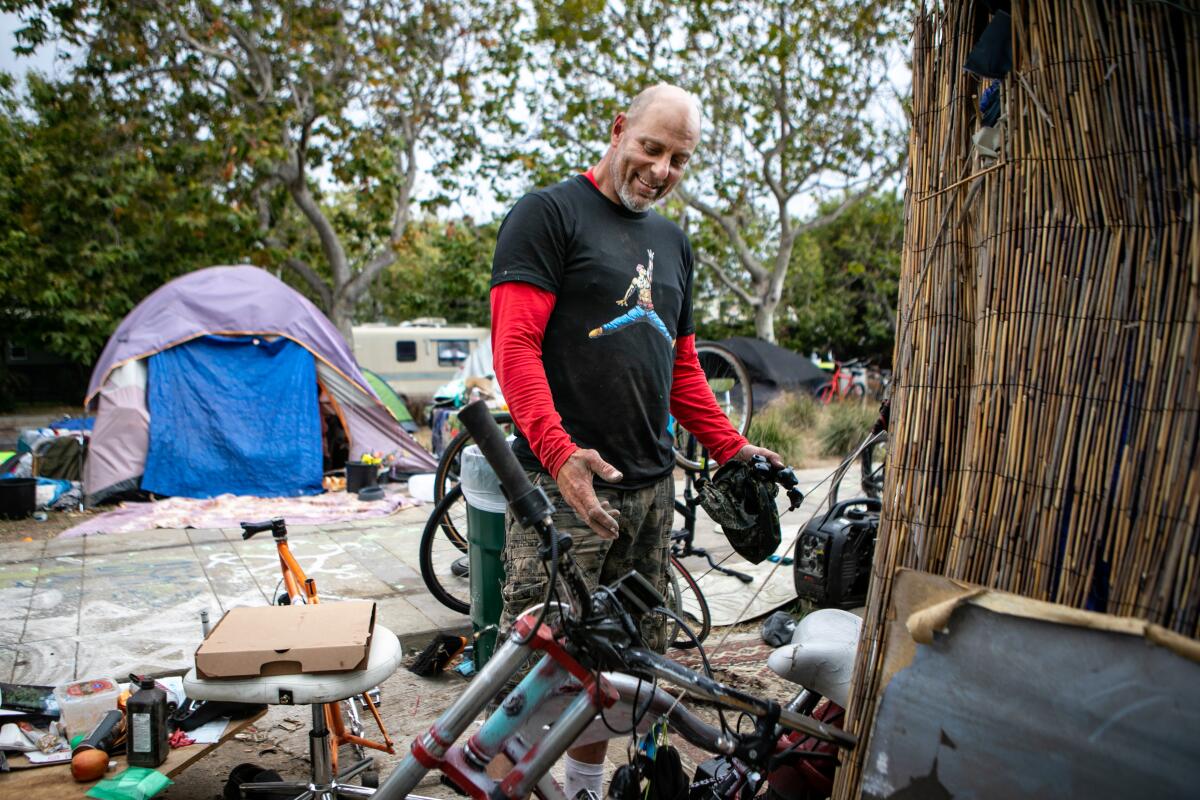
- Share via
When Traci Park looks out on her home community of Venice and much of the Westside, she sees a “dystopian nightmare” — tents lining the Venice Boulevard median, fires erupting seemingly every day in encampments and violent crime spiraling “off the charts.”
Living less than a mile north and east, Erin Darling also sees the expanded ranks of unhoused people and increases in some, but not all, types of crime. Darling views the unhoused largely as working-class people who are the victims of a “structural problem” of low wages and expensive housing and “not the product of some moral failing.”
Park and Darling occupy opposite ends of an ideological spectrum in the race to represent the Westside on the Los Angeles City Council.
Darling, a civil rights and tenants’ rights attorney, wants more housing and services before the removal of street encampments. Park, a lawyer for cities and special districts, says encampments need to be removed immediately, with more work required to figure out how to deal with the most troubled people living on the street.
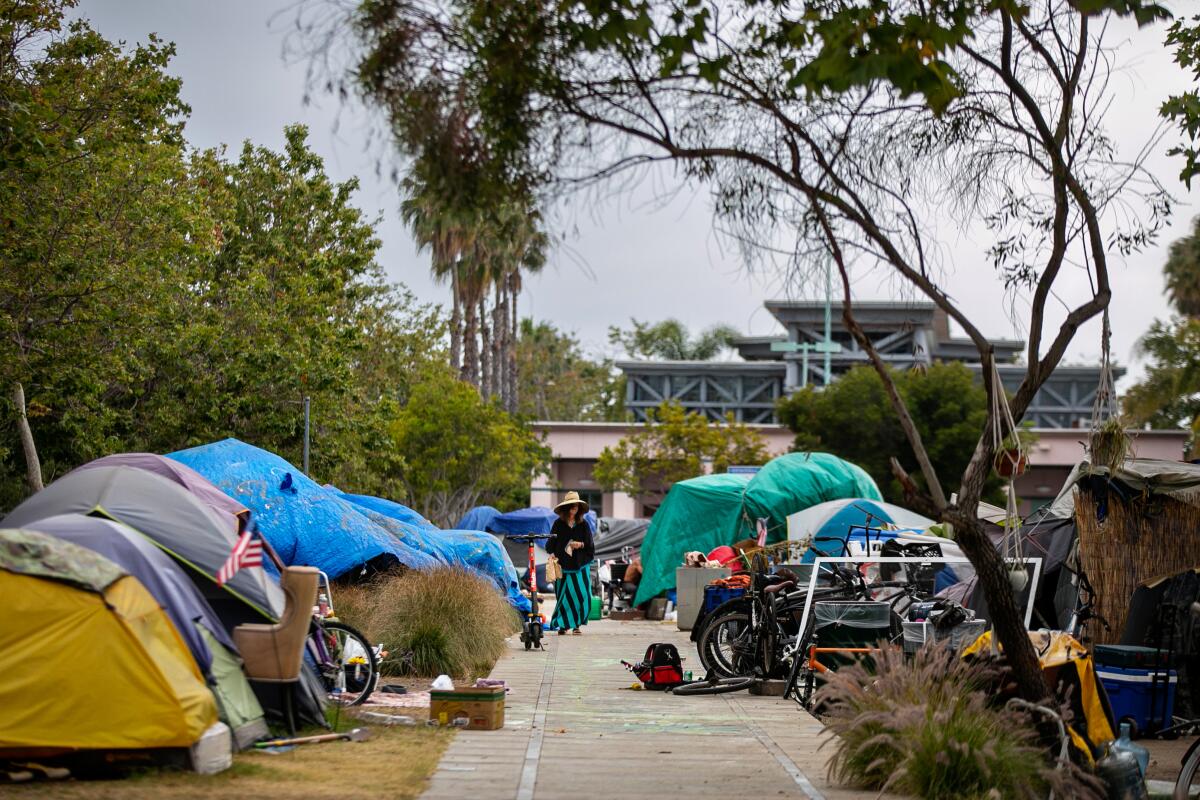
The two attorneys are among eight candidates competing in the June 7 election in the 11th Council District, vying to replace retiring Councilman Mike Bonin, one of the most liberal voices on the 15-member council. The race is viewed by many observers as the most broadly competitive of the eight council seats on the ballot, with the emotionally charged issue of homelessness challenging the famously tolerant sensibilities of the Westside.
The field in the district — which stretches from Pacific Palisades to Los Angeles International Airport and inland to Mar Vista, Brentwood and West L.A — includes as many as half a dozen candidates thought to have a decent chance of finishing in the top two, thereby earning a spot in a November runoff.
“I think it’s completely wide open,” said Fernando Guerra, director of Loyola Marymount University’s Center for the Study of Los Angeles. In what more than one candidate has called “a battle for the soul of the Westside” the contestants have remained civil, eschewing name-calling and taking mostly veiled swipes at one another.
The topic has been the subject of fervent speculation in recent weeks.
While 11th District residents will talk about other issues, like the need for affordable housing and the importance of reining in global warming, the conversation inevitably returns to one topic. “I don’t hear people complaining about inflation or gas prices or food prices, or about abortion,” said Sheila Goldberg, a liberal activist in Venice for half a century. “They are all talking about the homeless.”
A Twitter user who goes by @VeniceWasteland regularly posts video of fires, fistfights, public urination and more in Centennial Park, a green space in the center of Venice Boulevard that has replaced Ocean Front Walk as an epicenter of outdoor camping.
“If your neighbor was blasting music and screaming at 2 am, you could call the cops and they would hopefully come warn them to turn it down,” one Venice resident wrote to @VeniceWasteland. “But if your neighbors were a bunch of drug addicts setting up a commune at the park library across the street, you now have zero recourse.”
Many in the community have focused blame on Bonin, whom critics depict as out of touch and more sympathetic to the unhoused than he is to encampment neighbors. When a motor home burned on Main Street in Venice last year, someone graffitied it with “Boninville.”
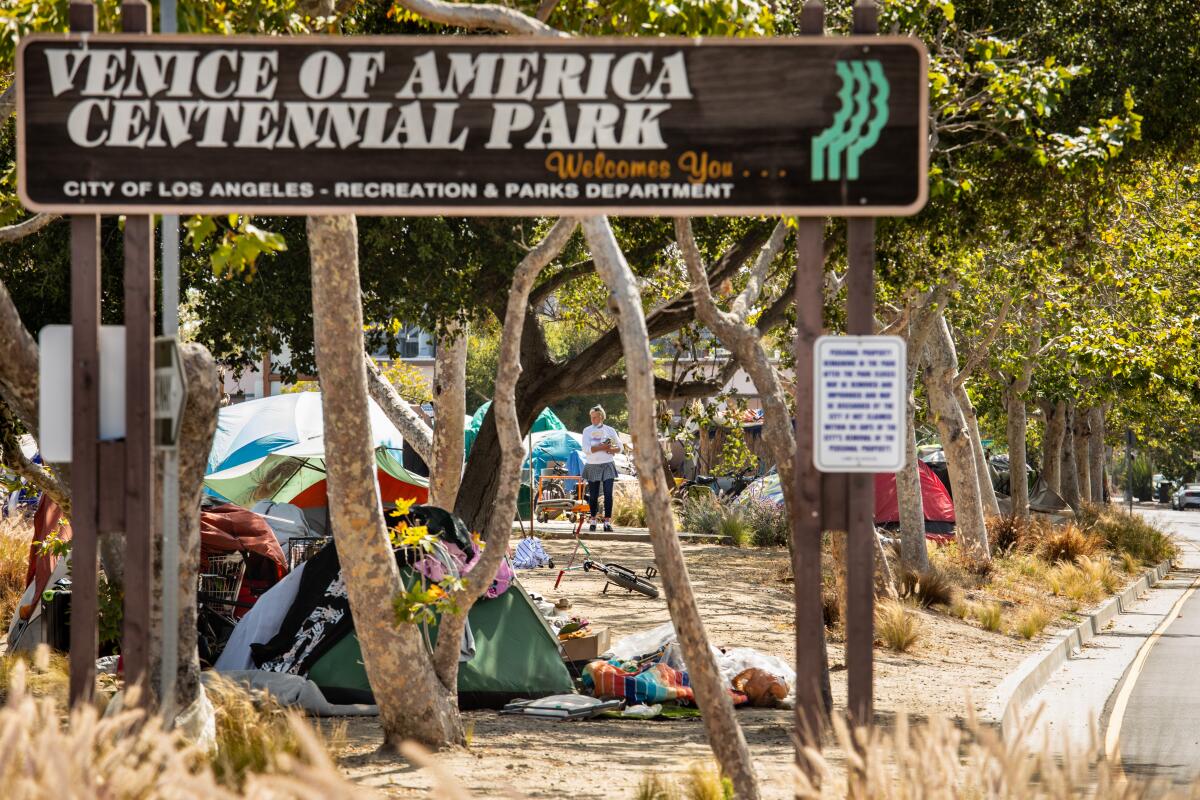
But others on the Westside defend their councilman, saying he has taken the principled position that homeless people mustn’t be uprooted until real alternatives are found. He pleased progressives by declining to use the city’s new anticamping ordinance to designate schools, parks and other public facilities as off-limits.
The councilman survived a recall attempt in January, when opponents fell about 1,350 signatures short of the more than 27,000 needed to force him onto the ballot. But a week after the ouster failed, he announced he wouldn’t seek a third term.
Darling has set himself apart from the other candidates by saying that he, too, believes it’s not right to ban camping without better alternatives. The 41-year-old lawyer decries his opponents for what he says is an “enforcement-only approach” that will just push homeless people from one neighborhood to the next, with the attitude: “I don’t care where they go, but they can’t be here.”
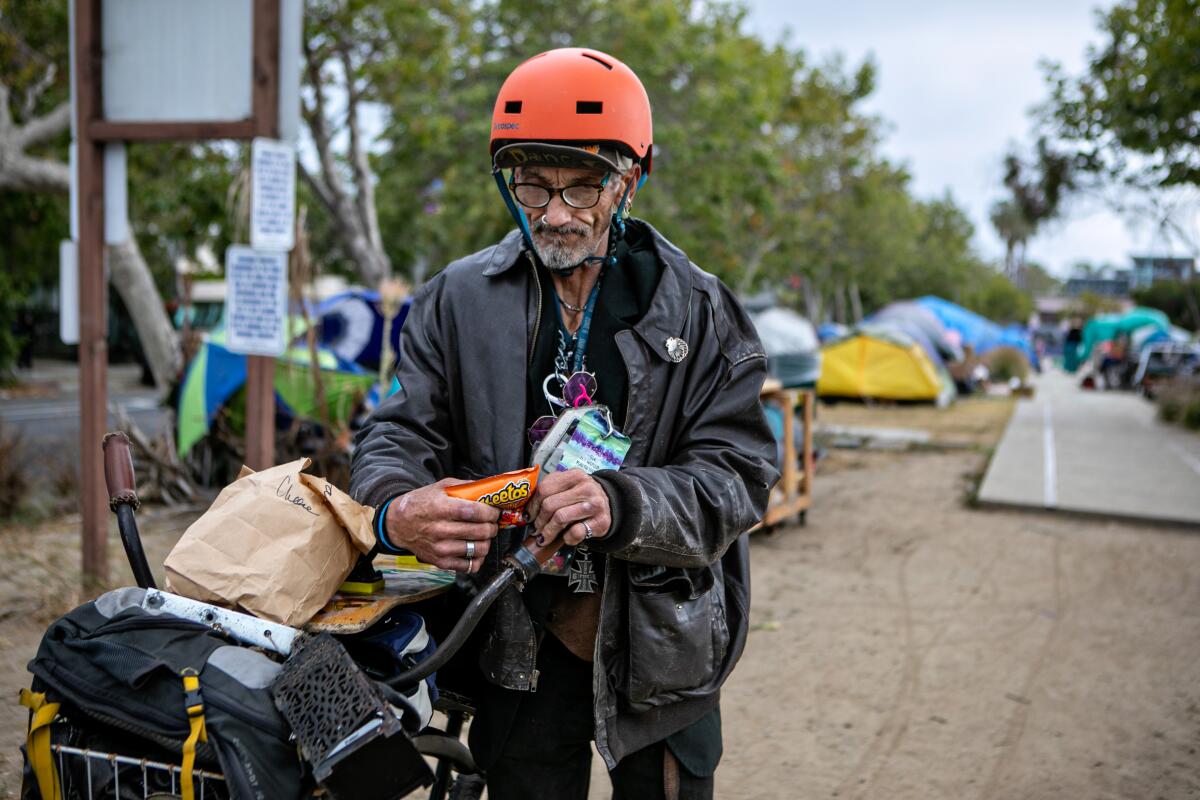
Perhaps the next-most-liberal candidate, 52-year-old Greg Good, says he would invoke the no-camping ban in some locations, notably adjacent to A Bridge Home shelter, which became a flashpoint when city officials didn’t follow through on promises to increase policing and ban camping in the surrounding neighborhood.
“It’s not tenable to just allow encampments to continue to expand under the auspices of waiting for the perfect housing,” Good said. “We need to build as much permanent affordable housing as possible. But we also need to look for every interim housing possibility that exists.”
The rest of those vying for the council seat say they would take more precipitous action.
Land use attorney and community activist Mike Newhouse, 47, touts a plan that he says would clear encampments within 30 days, claiming that enough temporary or permanent housing will be available, though some homeless services workers reject that assertion.
“If we don’t enforce our anticamping ordinances, more and more people will come here,” said Newhouse. “We have better weather. We’re a tolerant people. We’re a kind people. We have services. If you’re a homeless person, why wouldn’t you come here?”
Allison Holdorff Polhill, an attorney and top aide to Los Angeles school board member Nick Melvoin, said she would emphasize cutting red tape to allow successful homeless service providers an easier path to adding beds and services.
“As a city, we need to get out of their way and streamline those regulations,” said Holdorff Polhill, 56, who lives in Pacific Palisades.
Park rejects those who say her dark descriptions of the condition of the community stoke fear and animus for the homeless.
“I want those folks to get the services that they need … I want them to lead healthy, happy, productive lives,” Park said. “And I’m also extremely sensitive to and empathetic to the widespread anger and frustration of so many voters in this district. I understand it and feel the same.”
California’s 2022 primary election is Tuesday. Here’s how to cast a ballot.
The issue of law enforcement and the appropriate size of the LAPD has also divided the District 11 field.
Three of the candidates — Holdorff Polhill, Newhouse and Park — echo mayoral candidate Rick Caruso in calling for increasing the ranks of the LAPD to something close to 11,000 officers.
Good advocates keeping the force at about its current size but says he would use his district’s discretionary budget to beef up staffing of antinarcotics units. Darling decries attempts to “arrest our way to safety” and said he would focus on hiring more mental health workers.
Good and Darling also set themselves apart from the field as the only two candidates opposed to the recall of Dist. Atty. George Gascón, calling it “undemocratic” to recall an office holder for policy disagreements rather than malfeasance.
Park uses perhaps the toughest rhetoric in rejecting the D.A.: “If you’re tired of the catch and release, you need a D.A. who’s going to do his job and uphold the law and prosecute criminals,” she said. “Period.”
The 46-year-old Park is now considered a leading contender in part because of an infusion of support from law enforcement. Election of an outspoken pro-police representative would mark a sea change for Venice, where rebels half a century ago threatened to secede from Los Angeles to rid themselves of the Los Angeles Police Department.
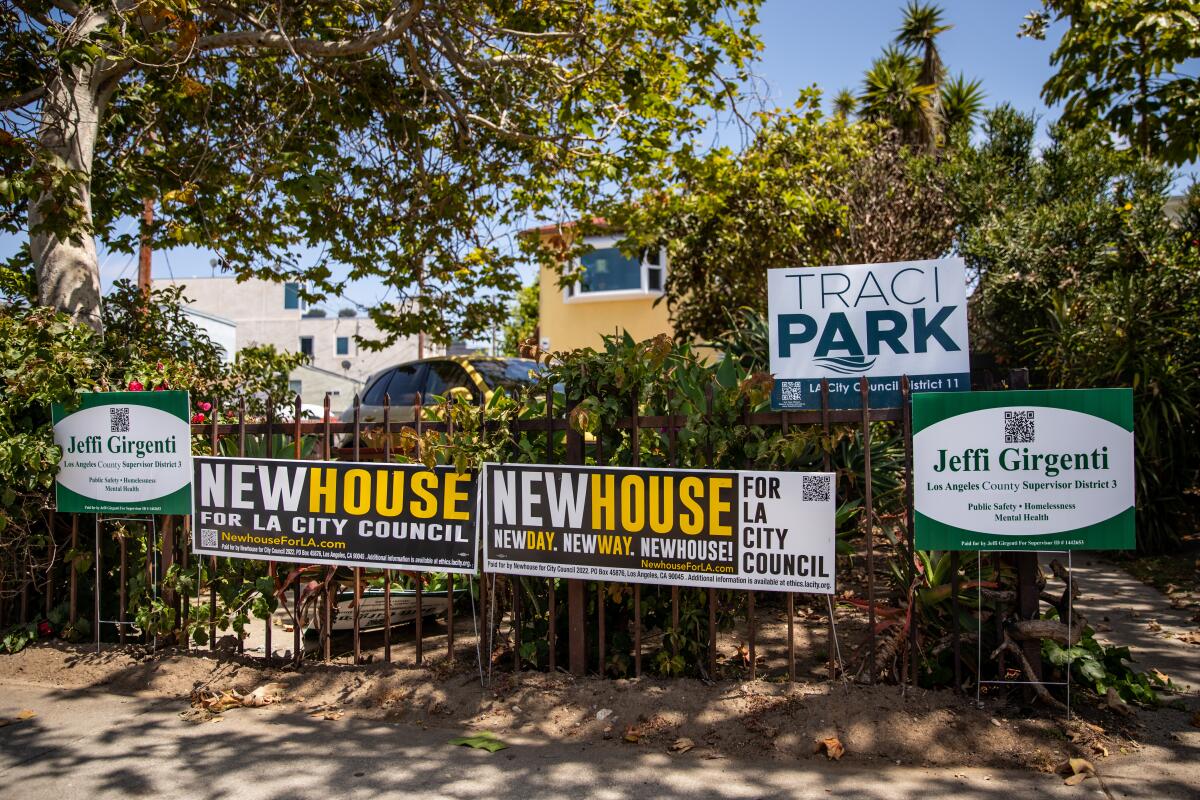
The lawyer, who has represented cities in bargaining with employees, has the backing of the unions representing rank-and-file officers in the LAPD, the county Sheriff’s Department and city firefighters. The Los Angeles Police Protective League has also helped organize an “independent expenditure” committee — which has attracted funds from apartment owners and real estate interests, among others.
Park already led the rest of the field in fundraising, with almost $390,000 raised by the third week in May — an advantage magnified by the $801,000 infusion of funds from independent committees, including the one organized by the police union.
Good stands second in the campaign funding race, with $245,000 collected, ahead of Newhouse and Holdorff Polhill. A union-supported independent committee has spent $78,000 to support Good, while the owner of a Malibu drug rehab facility has spent $51,000 to help Holdorff Polhill.
Park’s financial edge has allowed her to bombard voters with 91 messages, via email, snail mail, video and the internet, far more than any other candidate, even without the bonus of the independent spending by law enforcement and property interests.
While Darling lagged in fundraising at $72,000, he benefits from endorsements from some of the Westside’s most prominent elected officials, including state Sen. Ben Allen (D-Santa Monica) and Assemblyman Isaac Bryan (D-Los Angeles). The Los Angeles Times editorial board (which is separate from the news operation that produced this story) also endorsed Darling. And he has the support of the incumbent Bonin, who says Darling represents “the better angels of our nature.”
Park touts support from the public safety unions, along with the Los Angeles Business Federation and Los Angeles Area Chamber of Commerce. Newhouse has backing from the Santa Monica Police Officers Assn. and the L.A. chamber group (which issued a dual endorsement, including Park). Good advertises backing from the Sierra Club, the L.A. League of Conservation Voters and Planned Parenthood.
Loyola’s Guerra said he believes Westside voters maintain their core liberal values, but a series of challenges — the COVID-19 pandemic, an uptick in some categories of crime and an increase in homelessness — “have them questioning whether the approach that liberal, Democratic L.A. has been pursuing is meeting the moment and leads to effective governing.”
Candidates in the 11th District have been arguing that their biographies represent the appropriate balance between understanding the city bureaucracy, while also having the chops to challenge it.
Good, who lives in Del Rey, tells voters that his time as chief of legislative and external affairs for Garcetti and then president of the Board of Public Works means he will know how to win votes and govern effectively from Day One in office. But he says he had enough time working for activist organizations like the Los Angeles Alliance for a New Economy that he knows how to fight like an outsider.
Holdorff Polhill said her work at the Los Angeles Unified School District earned her a reputation as a “fixer,” who helped get meals to students and families during the COVID-19 crisis and move tent camps away from schools. “I’ve dealt with large budgets and large bureaucracies,” she said, “and I’m known for cutting through and getting things done quickly.”
Park said that though she hasn’t worked inside L.A. City Hall, she has advised local governments for years, including writing one of the first policies in the state for police body cameras. “I have been extremely involved and entrenched in municipal issues across the state for years,” she said.
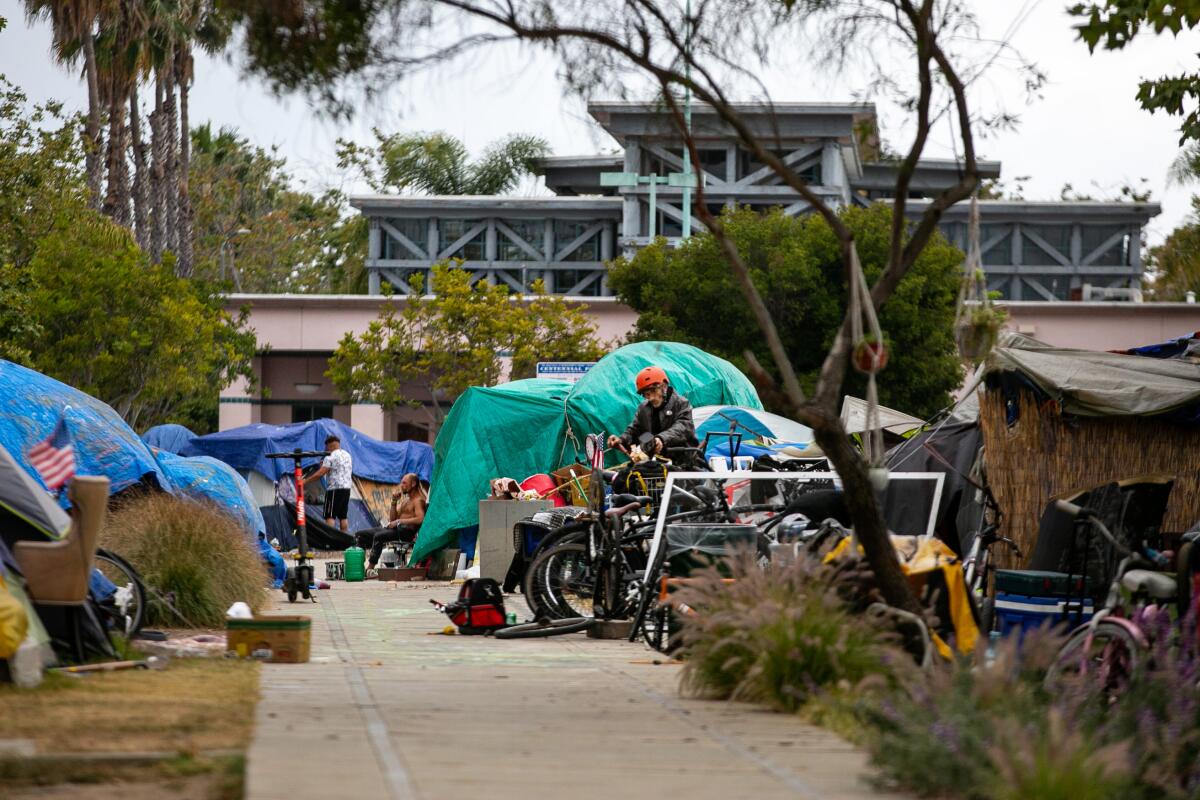
Newhouse claims “inside City Hall knowledge but outside City Hall experience,” because of his work as president of the Venice Neighborhood Council, then with a coalition of homeowner groups he helped found and as a mayoral appointee to the regional planning commission for the Westside.
The current president of the Venice Neighborhood Council, 69-year-old Jim Murez, claims credit for bringing a farmers market to the community and for the plan to plant 650 trees along Venice Boulevard. Murez has said he would fight against the push, now enshrined in state law, to add more units in neighborhoods previously zoned only for single-family homes.
Mathew Smith, 49, stands apart as a Republican and the “only conservative” in the race. The Westchester resident, who runs a medical courier business, has raised under $10,000 for his campaign, limiting his ability to get his message out. Smith says he would restore respect for police, get rid of encampments and look for solutions to the homeless crisis “outside the district.”
The eighth candidate, Midsanon Lloyd, is a teacher who has raised no money and been largely unseen during the campaign.
Darling says that in his work as a federal public defender and for the Eviction Defense Network gave him unique access to the sorts of ordinary Angelenos who confront homelessness.
“I’ve done the work,” he said, “and I’m running now to maintain the economic and racial diversity of the Westside.”
More to Read
Sign up for Essential California
The most important California stories and recommendations in your inbox every morning.
You may occasionally receive promotional content from the Los Angeles Times.

